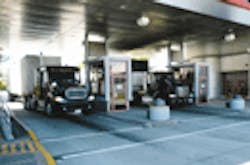While the focus in recent years has been on the U.S.-Mexico border and the fight for free access to U.S. roadways for Mexican trucks, a significant change is occurring at America’s other border as well. And it’s a change that many smaller U.S.-based shippers and carriers may not be ready for.
U.S. carriers and shippers have been dealing with U.S. Customs’ e-manifest program for a number of years now, but starting this month, carriers and shippers will need to deal with a similar program when they return from Canada with loads.
The Canada Border Services Agency (CBSA) is set to mimic the U.S. electronic manifest program, called Automated Commercial Environment (ACE), with the latest update to its own initiative, the Advanced Commercial Information (ACI) program, which was launched in 2004 and has been installed in phases since then.
Both programs require carriers to supply e-manifest data such as driver identification, vehicle identification, and load information, to Customs one hour prior to the truck’s arrival at the border crossing. In operation since 2004 for clearing U.S. Customs, CBSA is now ready to implement its program, likely beginning this month.
This third phase, targeted to highway and rail carriers, began rolling out in October 2010 in a test program, but CBSA is now set to roll it out to all carriers and shippers.
“Carriers who have made the investment to cross the border already have these systems in place,” Jennifer Fox, vice president of customs and compliance for the Canadian Trucking Alliance, told Fleet Owner. “And it’s giving them a distinct advantage.”
According to Fox, carriers will have 18 months from the official launch date to come into compliance. For the first year, the program is voluntary, but beginning 12 months from the launch, expected to be August of 2012 at this point, compliance is mandatory, with penalties for those that do not comply.
“There’s a bit of a learning curve and a bit of intimidation factor as well in moving from paper to electronic files,” Fox said, adding that there are currently 186 qualifying carriers that can submit e-manifests with 70 actually doing so. Nineteen more carriers are in the testing phase at this point, she said.
Carriers actually have two choices when it comes to submitting the documents, Fox said. First, they can purchase software that will perform the task, or they could use a free web portal being offered by CBSA to submit documentation. The free portal, Fox said, would likely be cumbersome for carriers that cross the border frequently, but should work quite well for those that don’t cross often enough to recoup the investment in a software program.
The overall process, Fox said, should provide faster transit times and improved service, particularly for less-than-truckload carriers. Currently, the products of each shipper on a trailer must have a barcode associated with them that a CBSA officer scans. In some cases, an LTL trailer may have 500 different shippers, creating a lengthy border-crossing process. Under the e-manifest system, only one barcode per trailer will be needed, Fox said.
“It really speeds up the LTL process, so what is happening is it’s also speeding up the process through the line [for everyone],” Fox pointed out.
Once at the border, the driver will present an e-manifest identifier, which will either be a barcoded Conveyance Referring Number (CRN or trip number), or a barcoded Cargo Control Number (CCN) with the CRN hand-written on it, said Jackson Wood, corporate business manager of MSR eCustoms, a provider of custom compliance solutions. Carriers should note that the CRN and the CCN have to start with their four character CBSA assigned carrier code, he added.
The real challenge for the program, Fox said, is educating shippers – particularly U.S.-based shippers – on the level of shipment detail that is needed to clear Canadian Customs in a timely and efficient manner.
“The biggest issue is opening lines of communication with shippers and customs brokers,” Fox said. “The larger shippers are aware, but when it comes to small- and medium-sized enterprises, which actually make up the largest group of shippers, there are” a lot who don’t know about the program or who don’t understand the process.
“This is something new for U.S. shippers who have never had to be this descriptive before,” Fox added, noting that just listing a shipment’s description as “parts” will result in rejection of the manifest by Customs personnel.
